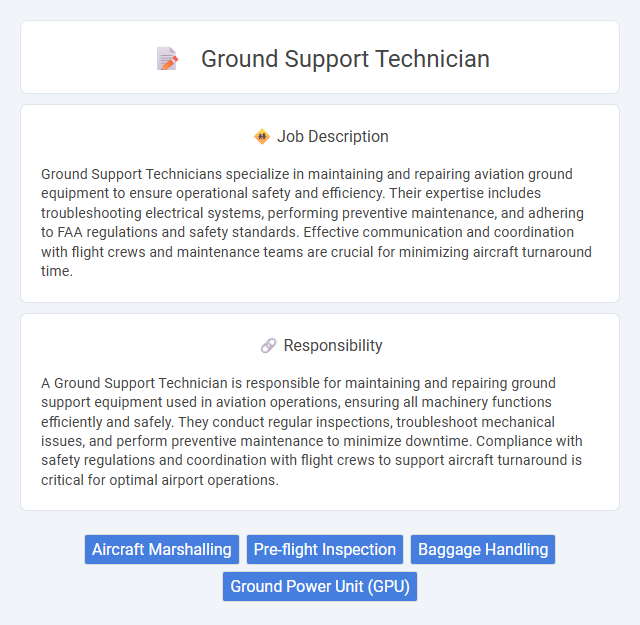
Ground Support Technicians specialize in maintaining and repairing aviation ground equipment to ensure operational safety and efficiency. Their expertise includes troubleshooting electrical systems, performing preventive maintenance, and adhering to FAA regulations and safety standards. Effective communication and coordination with flight crews and maintenance teams are crucial for minimizing aircraft turnaround time.
Individuals with strong physical stamina and the ability to work in variable weather conditions are likely to be well-suited for the Ground Support Technician role. People who thrive in fast-paced, team-oriented environments and possess good problem-solving skills may have a higher probability of success in this job. Those sensitive to demanding outdoor work or irregular hours might find this position challenging to maintain long-term.
Qualification
Ground Support Technicians typically require a high school diploma or equivalent, with many employers preferring candidates who hold certifications in aviation maintenance or related technical fields. Proficiency in operating ground support equipment such as tugs, loaders, and de-icing machines is essential, along with a solid understanding of safety protocols and regulations set by aviation authorities like the FAA or EASA. Strong mechanical skills, attention to detail, and the ability to work in fast-paced environments are critical qualifications for success in this role.
Responsibility
A Ground Support Technician is responsible for maintaining and repairing ground support equipment used in aviation operations, ensuring all machinery functions efficiently and safely. They conduct regular inspections, troubleshoot mechanical issues, and perform preventive maintenance to minimize downtime. Compliance with safety regulations and coordination with flight crews to support aircraft turnaround is critical for optimal airport operations.
Benefit
Ground Support Technicians likely enjoy benefits such as competitive salaries and comprehensive health insurance, contributing to financial stability and well-being. Opportunities for career advancement and specialized training might enhance their professional growth and job satisfaction. Consistent work schedules and a strong safety culture may also provide a balanced work-life experience.
Challenge
Ground Support Technicians likely face the challenge of rapidly diagnosing and resolving technical issues under tight time constraints, ensuring minimal disruption to flight operations. The complexity of modern aircraft systems increases the probability of encountering unpredictable mechanical or electronic malfunctions. Safety regulations and the necessity for precise maintenance protocols suggest a demanding environment that requires constant vigilance and adaptability.
Career Advancement
Ground Support Technicians gain hands-on experience maintaining and troubleshooting aircraft ground support equipment, building a strong technical foundation essential for career growth. Advancing in this field often involves earning relevant certifications such as FAA Airframe and Powerplant licenses, which open pathways to senior technician or supervisory roles. Continued education and specialized training in advanced systems position these professionals for opportunities in aerospace maintenance management and aviation operations leadership.
Key Terms
Aircraft Marshalling
Ground Support Technicians specializing in Aircraft Marshalling play a critical role in guiding aircraft safely on airport aprons using standardized hand signals and communication tools. Their expertise in coordinating with pilots and ground crews ensures efficient aircraft parking, taxiing, and departure, minimizing risks and enhancing airport operational safety. Proficiency in aviation safety regulations and acute situational awareness are essential for effective aircraft marshalling and ground support.
Pre-flight Inspection
Ground Support Technicians perform critical pre-flight inspections to ensure aircraft safety and operational readiness by meticulously checking hydraulic systems, tire pressure, and fuselage integrity. They use specialized diagnostic tools to detect potential mechanical issues, preventing in-flight malfunctions and minimizing downtime. Accurate documentation of inspection findings is essential for maintenance records and regulatory compliance.
Baggage Handling
Ground Support Technicians specializing in baggage handling ensure the efficient loading, unloading, and transfer of passenger luggage between aircraft and terminal facilities. They operate and maintain equipment such as conveyor belts, baggage carts, and scanning devices to streamline baggage movement while maintaining strict adherence to safety protocols. Their role directly impacts on-time departures and overall passenger satisfaction by minimizing baggage delays and losses.
Ground Power Unit (GPU)
Ground Support Technicians specialize in operating and maintaining Ground Power Units (GPUs) to supply external electrical power to aircraft during ground operations. Expertise in GPU diagnostics, component repair, and safety protocols ensures continuous power delivery for avionics testing, cabin systems, and engine starts. Proficiency with various GPU models and compliance with aviation industry standards is critical to minimize downtime and support efficient aircraft turnaround.
 kuljobs.com
kuljobs.com